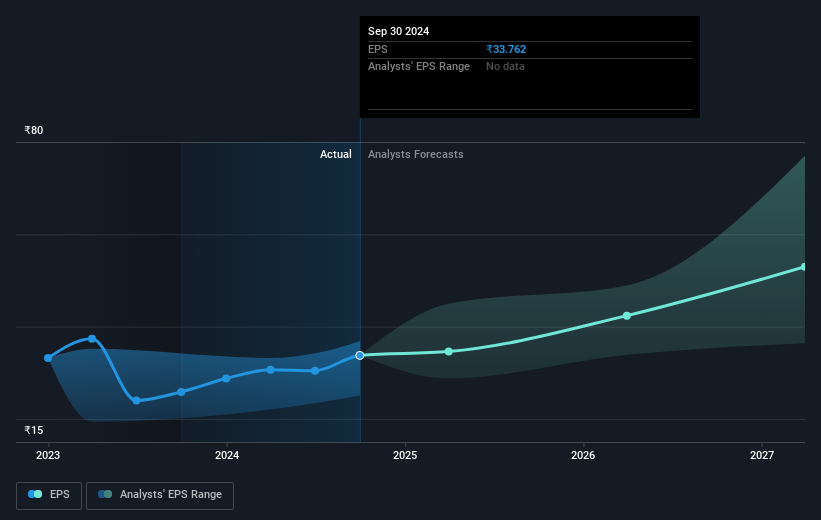- India
- /
- Real Estate
- /
- NSEI:PHOENIXLTD
Phoenix Mills' (NSE:PHOENIXLTD) five-year earnings growth trails the incredible shareholder returns
For many, the main point of investing in the stock market is to achieve spectacular returns. While the best companies are hard to find, but they can generate massive returns over long periods. Just think about the savvy investors who held The Phoenix Mills Limited (NSE:PHOENIXLTD) shares for the last five years, while they gained 363%. This just goes to show the value creation that some businesses can achieve. In more good news, the share price has risen 20% in thirty days.
Since it's been a strong week for Phoenix Mills shareholders, let's have a look at trend of the longer term fundamentals.
See our latest analysis for Phoenix Mills
While markets are a powerful pricing mechanism, share prices reflect investor sentiment, not just underlying business performance. One flawed but reasonable way to assess how sentiment around a company has changed is to compare the earnings per share (EPS) with the share price.
Over half a decade, Phoenix Mills managed to grow its earnings per share at 13% a year. This EPS growth is slower than the share price growth of 36% per year, over the same period. This suggests that market participants hold the company in higher regard, these days. That's not necessarily surprising considering the five-year track record of earnings growth. This optimism is visible in its fairly high P/E ratio of 59.90.
The company's earnings per share (over time) is depicted in the image below (click to see the exact numbers).

It is of course excellent to see how Phoenix Mills has grown profits over the years, but the future is more important for shareholders. Take a more thorough look at Phoenix Mills' financial health with this free report on its balance sheet.
What About Dividends?
It is important to consider the total shareholder return, as well as the share price return, for any given stock. The TSR incorporates the value of any spin-offs or discounted capital raisings, along with any dividends, based on the assumption that the dividends are reinvested. Arguably, the TSR gives a more comprehensive picture of the return generated by a stock. We note that for Phoenix Mills the TSR over the last 5 years was 366%, which is better than the share price return mentioned above. This is largely a result of its dividend payments!
A Different Perspective
It's nice to see that Phoenix Mills shareholders have received a total shareholder return of 61% over the last year. And that does include the dividend. That gain is better than the annual TSR over five years, which is 36%. Therefore it seems like sentiment around the company has been positive lately. Given the share price momentum remains strong, it might be worth taking a closer look at the stock, lest you miss an opportunity. Before forming an opinion on Phoenix Mills you might want to consider these 3 valuation metrics.
Of course, you might find a fantastic investment by looking elsewhere. So take a peek at this free list of companies we expect will grow earnings.
Please note, the market returns quoted in this article reflect the market weighted average returns of stocks that currently trade on Indian exchanges.
New: Manage All Your Stock Portfolios in One Place
We've created the ultimate portfolio companion for stock investors, and it's free.
• Connect an unlimited number of Portfolios and see your total in one currency
• Be alerted to new Warning Signs or Risks via email or mobile
• Track the Fair Value of your stocks
Have feedback on this article? Concerned about the content? Get in touch with us directly. Alternatively, email editorial-team (at) simplywallst.com.
This article by Simply Wall St is general in nature. We provide commentary based on historical data and analyst forecasts only using an unbiased methodology and our articles are not intended to be financial advice. It does not constitute a recommendation to buy or sell any stock, and does not take account of your objectives, or your financial situation. We aim to bring you long-term focused analysis driven by fundamental data. Note that our analysis may not factor in the latest price-sensitive company announcements or qualitative material. Simply Wall St has no position in any stocks mentioned.
About NSEI:PHOENIXLTD
Phoenix Mills
Engages in the operation and management of malls, construction of commercial and residential properties, and hotel business in India.
Excellent balance sheet with reasonable growth potential.
Similar Companies
Market Insights
Community Narratives



